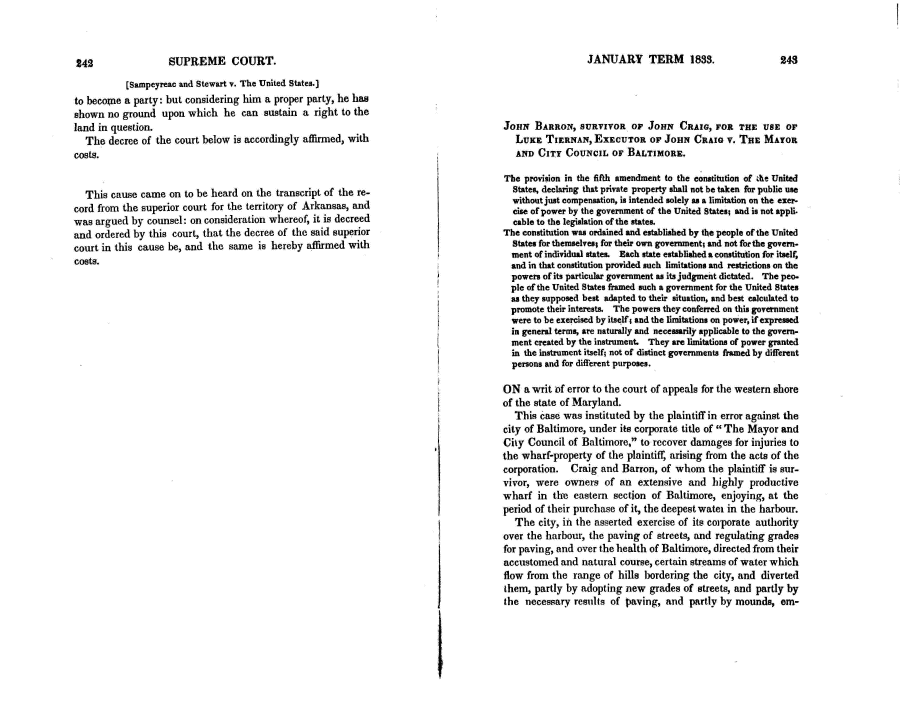|
242
SUPREME COURT.
[Sampeyreac and Stewart v. The United States.]
to become a party: but considering him a proper party, he has
shown no ground upon which he can sustain a right to the
land in question.
The decree of the court below is accordingly affirmed, with
costs.
This cause came on to be heard on the transcript of the re-
cord from the superior court for the territory of Arkansas, and
was argued by counsel: on consideration whereof, it is decreed
and ordered by this court, that the decree of the said superior
court in this cause be, and the same is hereby affirmed with
costs.
JANUARY TERM 1833.
243
JOHN BARRON, SURVIVOR OF JOHN CRAIG, FOR THE USE OF
LUKE TIERNAN, EXECUTOR OF JOHN CRAIG v. THE MAYOR
AND CITY COUNCIL OF BALTIMORE.
The provision in the fifth amendment to the constitution of the United
States, declaring that private property shall not be taken for public use
without just compensation, is intended solely as a limitation on the exer-
cise of power by the government of the United States; and is not appli-
cable to the legislation of the states.
The constitution was ordained and established by the people of the United
States for themselves; for their own government; and not for the govern-
ment of individual states. Each state established a constitution for itself,
and in that constitution provided such limitations and restrictions on the
powers of its particular government as its judgment dictated. The peo-
ple of the United States framed such a government for the United States
as they supposed best adapted to their situation, and best calculated to
promote their interests. The powers they conferred on this government
were to be exercised by itself; and the limitations on power, if expressed
in general terms, are naturally and necessarily applicable to the govern-
ment created by the instrument. They are limitations of power granted
in the instrument itself; not of distinct governments framed by different
persons and for different purposes.
ON a writ of error to the court of appeals for the western shore
of the state of Maryland.
This case was instituted by the plaintiff in error against the
city of Baltimore, under its corporate title of " The Mayor and
City Council of Baltimore," to recover damages for injuries to
the wharf-property of the plaintiff, arising from the acts of the
corporation. Craig and Barron, of whom the plaintiff is sur-
vivor, were owners of an extensive and highly productive
wharf in the eastern section of Baltimore, enjoying, at the
period of their purchase of it, the deepest water in the harbour.
The city, in the asserted exercise of its corporate authority
over the harbour, the paving of streets, and regulating grades
for paving, and over the health of Baltimore, directed from their
accustomed and natural course, certain streams of water which
flow from the range of hills bordering the city, and diverted
them, partly by adopting new grades of streets, and partly by
the necessary results of paving, and partly by mounds, em-
|

